
The politics of Guyana takes place in a framework of a representative democratic assembly-independent republic, whereby the President of Guyana is the head of government and of a multi-party system. Executive power is exercised by the President, advised by a cabinet. Legislative power is vested in both the President and the National Assembly of Guyana. The judiciary is independent of the executive and the legislature.
The history of Guyana begins about 35,000 years ago with the arrival of humans coming from Eurasia. These migrants became the Carib and Arawak tribes, who met Alonso de Ojeda's first expedition from Spain in 1499 at the Essequibo River. In the ensuing colonial era, Guyana's government was defined by the successive policies of the French, Dutch, and British settlers. During the colonial period, Guyana's economy was focused on plantation agriculture, which initially depended on slave labor. Guyana saw major slave rebellions in 1763 and 1823. Following the Slavery Abolition Act of 1833, 800,000 enslaved Africans in the Caribbean and South Africa were freed, resulting in plantations contracting indentured workers, mainly from India. Eventually, these Indians joined forces with Afro-Guyanese descendants of slaves to demand equal rights in government and society. After the Second World War, the British Empire pursued policy decolonization of its overseas territories, with independence granted to British Guiana on May 26, 1966. Following independence, Forbes Burnham rose to power, quickly becoming an authoritarian leader, pledging to bring socialism to Guyana. His power began to weaken following international attention brought to Guyana in wake of the Jonestown mass murder suicide in 1978.

"Green Land of Guyana" is the national anthem of Guyana. Robert Cyril Gladstone Potter composed the music, while the lyrics were authored by Archibald Leonard Luker. Two separate contests were held to determine the words and the tune, respectively. It was adopted as the national anthem in 1966, when the country gained independence from the United Kingdom.

The National Democratic Alliance (NDA) is a centre-right to right-wing conservative Indian political alliance led by the right-wing Bharatiya Janata Party (BJP). It was founded in 1998 and currently controls the government of India as well as the government of 17 Indian states and one Union territory.
An electoral alliance is an association of political parties or individuals that exists solely to stand in elections.

Linden Forbes Sampson Burnham was a Guyanese politician and the leader of the Co-operative Republic of Guyana from 1964 until his death in 1985. He served as Premier of British Guiana from 1964 to 1966, Prime Minister of Guyana from 1964 to 1980 and then as the first Executive President of Guyana from 1980 to 1985. He is often regarded as a strongman who embraced his own version of socialism.

The People's Progressive Party/Civic (PPP/C) is a major political party in Guyana. As of 2020, the party holds 33 of the 65 seats in the National Assembly and forms the government. It has been the ruling party in the past as well, most recently between 1992 and 2015. In Guyana's ethnically divided political landscape, the PPP/C is a multi-ethnic organization that is supported primarily by Indo-Guyanese people.
United Force (UF) is a conservative and economically liberal political party in Guyana. It currently has no representation in the National Assembly and is led by Marissa Nadir.

The Guyana–Venezuela territorial dispute is an ongoing territorial dispute between Guyana and Venezuela over the Essequibo region, also known as Esequibo or Guayana Esequiba in Spanish, a 159,500 km2 (61,600 sq mi) area west of the Essequibo River. The territory, excluding the Venezuelan-controlled Ankoko Island, is controlled by Guyana as part of six of its regions, based on the 1899 Paris Arbitral Award, but is also claimed by Venezuela as the Guayana Esequiba State. The boundary dispute was inherited from the colonial powers and has persisted following the independence of Venezuela and Guyana.

Bilateral relations have been established between Guyana and the United States of America.

Guyana, officially the Co-operative Republic of Guyana, is a country on the northern coast of South America, part of the historic mainland British West Indies. Guyana is an indigenous word which means "Land of Many Waters". The capital city is Georgetown. Guyana is bordered by the Atlantic Ocean to the north, Brazil to the south and southwest, Venezuela to the west, and Suriname to the east. With a land area of 215,000 km2 (83,000 sq mi), Guyana is the third-smallest sovereign state by area in mainland South America after Uruguay and Suriname, and is the second-least populous sovereign state in South America after Suriname; it is also one of the least densely populated countries on Earth. It has a wide variety of natural habitats and very high biodiversity.

General elections were held in British Guiana on 27 April 1953. They were the first held under universal suffrage and resulted in a victory for the People's Progressive Party (PPP), which won 18 of the 24 seats in the new House of Assembly. Its leader, Cheddi Jagan, became Prime Minister.

A Partnership for National Unity (APNU) is a political alliance in Guyana.

Good and Green Guyana (GGG) was a political party in Guyana.
God Bless Guyana (GBG) was a political party in Guyana led by Hardat Persaud. Its symbol was a dove carrying a wheat straw.

The Guyana Labour Party (GLP) was a political party in Guyana.

Snap general elections were held in Guyana on 2 March 2020. They were called early after the government of President David A. Granger lost a vote of no confidence by a margin of 33–32 on 21 December 2018, the government having held a one-seat majority since the 2015 elections. However, one of its own MPs, Charrandas Persaud of the Alliance for Change (AFC), voted with the opposition. Granger announced on 25 September 2019 that the elections would be held on 2 March 2020.

Mohamed Irfaan Ali is a Guyanese politician serving as the tenth and current president of Guyana since 2020. A member of the People's Progressive Party/Civic (PPP/C), he previously served as the minister of Housing and Water from 2009 to 2015. He is the first Muslim to hold office, and is the second Muslim head of state in the Americas after Noor Hassanali of Trinidad and Tobago.

The Australian Federation Party (AFP), also known as AusFeds and formerly known as the Country Alliance and the Australian Country Party, is an Australian political party. Founded in 2004 by four rural Victorians, the party lodged its initial registration with the Victorian Electoral Commission on 15 August 2005.












